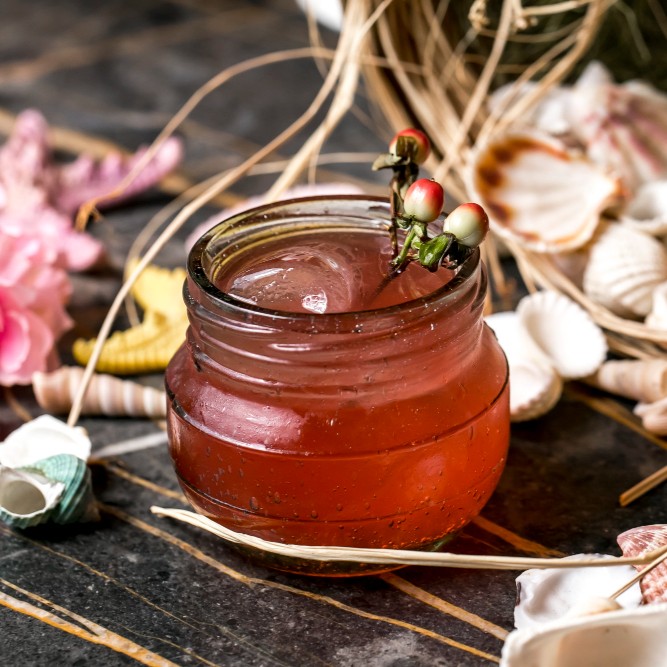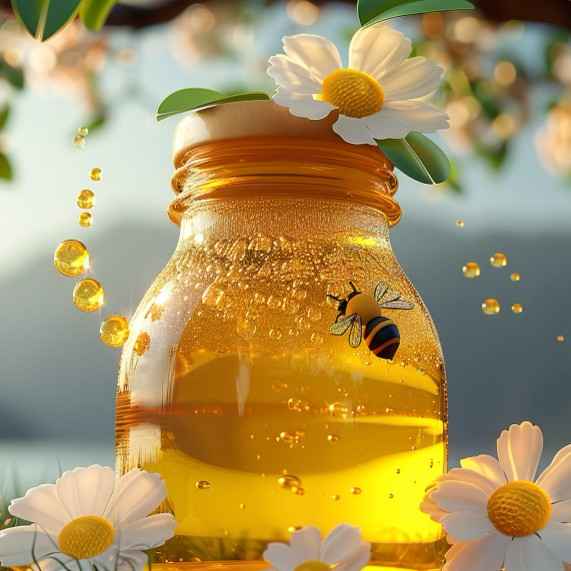Discover Our Honey Flavors
We are thrilled to present a curated collection of six exquisite natural honey flavours, Each Flavour telling its own story of Bharat's diverse flora and the tireless work of our beloved bees
Acacia Honey
While more prevalent in Europe, Acacia (often locally known as Babul in some regions, though true Acacia honey comes from Robinia pseudoacacia or "black locust") is gaining popularity in India for its delicate charm. Imagine bees gathering nectar from pristine, almost white blossoms, yielding a honey as clear as a Himalayan stream. Medicinal Benefits: Acacia honey is valued for its low glycemic index, making it a preferred choice for individuals mindful of their blood sugar levels. It's known for its mild antibacterial properties and often used to soothe common coughs and irritated throats. Its gentle nature makes it a popular and safe choice for children across Indian households. Bees & Regions: Primarily extracted by Apis mellifera (the European honey bee, now widely established in India) in regions of Kashmir.

Multiflora Honey
This honey is of India's vast and vibrant landscapes. Imagine a sun-drenched maidan or a bustling village garden, bursting with a range of seasonal wildflowers. Multiflora honey is just that a celebration of Bharat's incredible biodiversity. Its flavour profile dynamically shifts with the seasons and the specific floral tapestry of each region, offering a delightful and ever-evolving surprise with every jar. It truly embodies the spirit of India's agricultural and natural abundance. Medicinal Benefits: A true powerhouse of diverse pollens and nectar, Multiflora honey is profoundly rich in antioxidants and a broad spectrum of vitamins and minerals unique to India's flora. Its varied floral sources contribute to its potent immunomodulatory properties, making it excellent for general well-being and boosting natural resistance, a common household remedy for centuries. It's also frequently used to help alleviate seasonal allergies, as it contains traces of various local pollens. Bees & Regions: Extracted by both Apis mellifera and indigenous Indian Honey Bees (Apis cerana indica) from almost all regions across India, from the plains of Punjab to the hills of Himachal, Uttarakhand and Jammu wherever diverse flowering plants are abundant throughout the year.

Ajwain Honey
This honey carries the aromatic spirit of India's spice heartlands. Imagine bees diligently collecting nectar from the delicate white and pink blossoms of the Ajwain (Carom) plant, imbuing the honey with its characteristic warm, slightly pungent, and distinctly herbal notes. It's a flavor that immediately evokes the comforting aroma of tadka in Indian kitchens and the wisdom of traditional Ayurvedic remedies passed down through generations. Medicinal Benefits: Ajwain honey is highly prized in Ayurveda for its remarkable digestive benefits. It's traditionally known to aid in relieving indigestion, bloating, gas (apach), and abdominal discomfort. It also possesses strong antimicrobial and anti-inflammatory properties, making it beneficial for respiratory issues like coughs and colds, and promoting overall gut health. Bees & Regions: Extracted by Apis mellifera and Apis cerana indica in the agricultural regions Rajasthan, Madhya Pradesh, and Gujarat, where Ajwain (Trachyspermum ammi) is extensively cultivated for its seeds.
Litchi Honey
Imagine the lush, green litchi orchards of Bihar, heavy with ripe, ruby-red fruit, their sweet fragrance wafting through the air during late spring. Litchi honey captures the essence of this beloved Indian tropical delight, offering a light, fruity, and delicately floral flavor with a subtle hint of the litchi's characteristic tangy sweetness. It's a taste of the Indian summer, a pure and exotic sweetness from one of India's most cherished fruits. Medicinal Benefits: Litchi honey is known for its relatively high vitamin C content and good antioxidant properties, which contribute to immune system support and overall vitality. Its light and pleasant taste make it an easy and refreshing honey to consume, offering a natural energy boost. Bees & Regions: Mainly extracted by Apis mellifera and Apis cerana indica in major litchi-growing regions of India, notably Bihar, Uttar Pradesh, and West Bengal, during the litchi flowering season
Sidr Honey
Journey to the ancient, arid landscapes of Rajasthan, Gujarat, and parts of the Deccan, where the sacred Sidr tree (known locally as Ber or Indian Jujube) stands resilient, its thorny branches offering shade and sustenance. This honey, highly revered for centuries in India and the Middle East, carries the mystique of these venerable trees. It's known for its rich, thick consistency and bold, almost buttery flavor with a unique caramel-like finish. Sidr honey is often hailed as a premium, highly medicinal honey, often found in traditional hakim and Ayurvedic practices. Medicinal Benefits: Sidr honey is celebrated for its exceptionally potent antibacterial, antifungal, and antiviral properties. It's widely used in traditional Indian medicine for its efficacy in wound healing, alleviating digestive issues, and treating respiratory ailments. It's also believed to possess significant antioxidant properties and is highly valued for its overall therapeutic benefits and restorative qualities. Bees & Regions: Collected by Apis mellifera from the flowers of the Sidr tree (Ziziphus mauritiana in India, similar to Ziziphus spina-christi found in the parts of Rajasthan, Gujarat, and Maharashtra.
Jamun Honey
Experience the deep, slightly tart essence of the Jamun fruit, a staple of Indian summers and monsoon seasons, often associated with its unique color that stains lips and fingers. Jamun honey captures the unique flavor profile of this beloved berry - a distinctively dark, robust honey with a bittersweet aftertaste, reminiscent of the fruit itself. It's a taste deeply rooted in traditional Indian households, often consumed for its special health properties. Medicinal Benefits: Jamun honey is highly sought after across India for its significant potential benefits in managing blood sugar levels, making it particularly popular among individuals with diabetes. It's also rich in antioxidants and has anti-inflammatory properties, beneficial for overall health, improving digestion, and supporting pancreatic function as per traditional beliefs. Bees & Regions: Primarily extracted by Apis cerana indica and Apis mellifera from the beautiful white-pink flowers of the Jamun tree (Syzygium cumini) in various parts of Uttar Pradesh.
Certifications & Compliance
 (1)-1.png)